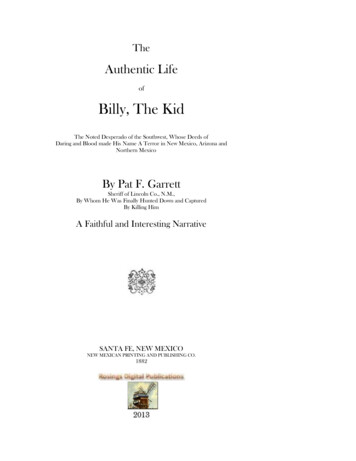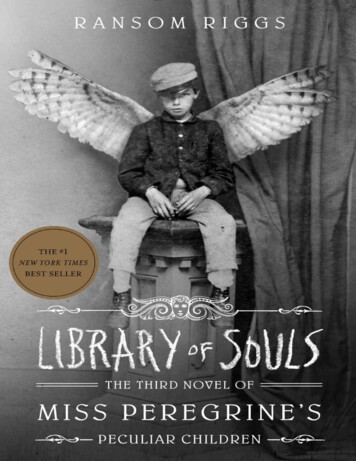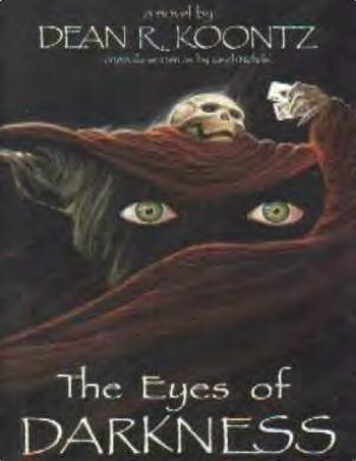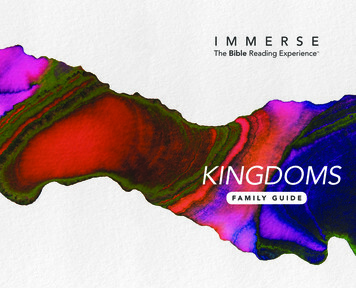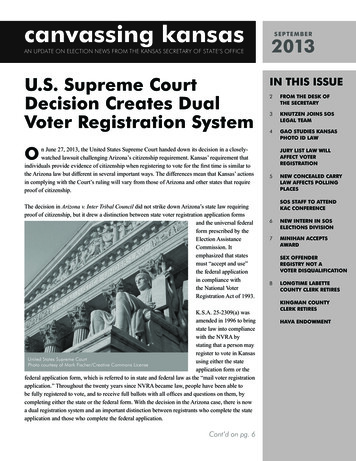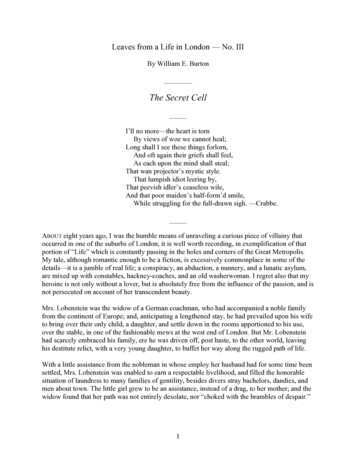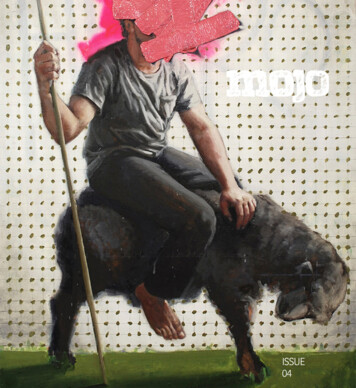
Transcription
“I swore never to be silentwhenever and wherever humanbeings endure suffering andhumiliation. We must alwaystake sides. Neutrality helpsthe oppressor, never the victim.Silence encourages the tormentor,never the tormented.”Jewish author and Holocaust survivor, Elie Wiesel,from his Nobel Prize acceptance speech
From the RabbiEach year Jews around the world observe Yom HaShoah —Holocaust Remembrance Day — commemorating a horrificchapter not only in the history of the Jewish people, but alsoin the history of the world. Motivated by a fanatical hatred ofJews and a desire to rid society of “undesirable” elements, theNazi regime that ruled Germany during the mid-20th centuryengaged in a systematic and brutal campaign to destroy theJewish people. Harvesting the fruits of seeds sown throughcenturies of anti-Semitism, they nearly succeeded, murderingsix million Jews, or about one third of the world’s Jewish population at the time.The full name of Holocaust Remembrance Day in Hebrew is actually “Yom HaShoahVe-Hagevurah,” meaning “Holocaust and Heroism Remembrance Day.” This remindsus that even though many ignored evidence of Nazi crimes, there were those whowent to great lengths to save Jews. Many of these heroes are remembered todayas “righteous gentiles.” In Holland, Corrie ten Boom sheltered those fleeing Nazioppression. In France, Pastor André Trocmé helped to make an entire town, LeChambon, a safe haven for persecuted Jews. Raoul Wallenberg, a Swedish Christian, rescued thousands of Jews from the Nazi death machine. And there were, ofcourse, many more who are less well-known, but no less deserving of our gratitude.Some say the Holocaust is too terrible to remember. But there is a reason why theJewish people have vowed to “never forget.” They remember so that they may preventsuch horrible events from ever occurring again.Today there seems to be a trend to forget the lessons taught by the Holocaust, or evento rewrite history as if it never occurred. The radical Islamic regime of Iran, whichhas dedicated itself to Israel’s destruction, held a “Holocaust denial” conference inrecent years that attracted not only Islamist fanatics, but Western academics andother public figures as well.Recent events in America, Europe, and around the world, where Jews of all ageshave been targeted for intimidation, vandalism, and even death in terrorist attacksby radical Islamists, are a stark reminder that “those who do not remember thepast are condemned to repeat it.” Indeed, my friends, the threat of anti-Semitismremains very real today.It is my hope and prayer that as you read the stories that follow of those who survivedthe horrors of the Holocaust and learn more about the history of anti-Semitism thatallowed the unthinkable to occur, you will join The Fellowship not only in caringfor and helping the survivors of this horrific event, but also in continuing to fightanti-Semitism whenever, and wherever, it occurs.With prayers for shalom, peace,Founder & President,International Fellowship of Christians and Jews
NEVERFORGETNever shall I forget that night, the first night in camp,which has turned my life into one long night,seven times sealed. Never shall I forget that smoke.Never shall I forget the little faces of children,whose bodies I saw turned to wreaths of smokebeneath a silent blue sky.IElie Wiesel, Night, (New York: Hill & Wang, 1960), 43–44t has been more than 70 years since the Holocaust — the year 2015 markingthe 70th anniversary of the liberation of the Auschwitz death camp. For some,the events remain real and ever-present. For others, the Holocaust seemslike ancient history. But, since those horrific events, the Jewish people haveadopted a motto: Never again. Never again will they allow such a catastropheto occur. From the ashes of Auschwitz, Treblinka, Dachau, Belzek, and other Nazi death camps, the Jewish people have vowed to live. As Rabbi YechielEckstein wrote in his book, How Firm a Foundation, “Like the psalmist longago, Jews today collectively declare,4
NEVER FORGETNEVER AGAIN“I will not die but live,and will proclaim what theLORD has done.”(Psalm 118:17)solemn day. Some Jewish people lightsix candles to represent the six million Jewish lives lost in the Holocaust.Holocaust survivors are encouraged toshare their stories at public events. InIsrael all public entertainment venuesare closed, and at 10:00 a.m., sirens aresounded throughout Israel, and everyone stops what they are doing for twominutes, even on busy highways, tostand in silent remembrance.Holocaust Remembrance Day, orYom HaShoah, was inaugurated in 1953as a day set aside to memorialize thesix million Jews murdered during theNazi reign of terror. As befits the eventit commemorates, Yom HaShoah is aHow should we respond to the Holocaust?As Rabbi Eckstein has noted, “All Jewsalive today regard themselves as Holocaust survivors since Hitler’s plan wasgenocidal—to eradicate the entireJewish nation. All bear the awesome responsibility of telling the story of thoseexcruciating years.” But how does oneaddress something so devastating;something that is at once unfathomable, yet real; something unspeakablethat we nonetheless must discuss in order to prevent it from ever happeningagain? Rabbi Eckstein proposes that,“The appropriate way to confront theHolocaust is first through silence andthen through well-considered words.Only after mourning the terrible lossdare we speak of that tragedy; onlyafter reverential silence may we risktalking about it.”Of the many responses to theHolocaust, support for Israel is perhaps the most widely accepted andmost deeply felt. “Israel is the symbolof the contemporary Jewish resolve tolive after having been tormented andpersecuted for centuries. She epitomizes the Jewish rebirth as a dynamic,living people The existence of Israelgoes to the very core of Jewish identitytoday,” says Rabbi Eckstein.He concludes that, “The primaryimperative Jews have elicited from theHolocaust is to live, and never allow asimilar Holocaust to occur again.” Andfor the Christian, the Rabbi adds thischallenge: “The primary imperativeto be elicited by Christians from theHolocaust is equally as compelling asis that of the Jews — to expunge anyand all traces of anti-Semitism andanti-Judaism from their midst They,too, are divinely obligated to ensureJewish survival and to prevent a futureHolocaust.”Will you join with us, Rabbi Eckstein,and millions around the world of allfaiths and backgrounds to reflect, tobe on guard, and to declare “NeverForget” and “Never Again”?5
NEVER FORGETNEVER AGAINTELLING THEIR STORIESOne significant way that we “never forget” is to keep the voicesof the Holocaust alive and strong through hearing the stories andexperiences of those who lived through this horrific chapter in history.Below are accounts from two such individuals who were courageousenough to share their story.JOSEF KATZJosef, a 75-year-old Ukrainian Jew,is a Holocaust survivor. DuringWorld War II he was imprisonedat the notorious Nazi death camp atAuschwitz. For many years, Josef kepthis horrific stories of the events duringthe war to himself.But recently, after encouragementfrom a worker at a local Hesed centerfunded by The Fellowship’s Isaiah 58program, he began telling his story.The center is a place of hope for Josef,where this impoverished man receivesfood and medical assistance on a regular basis. And now, it has also givenhim a means of release, and a sensethat his history will not be forgotten.“I was working in a coal mine whenthe frontline of the fighting was approaching,” Josef began. “We were6
NEVER FORGETNEVER AGAINmarched away in lines wearing prison clothes. We had wooden soles onour boots. It was cold and people wereweak. Those who couldn’t go furtherwere killed and stayed where they lay.We were driven forward this way forthree days, day and night. When thefront was coming too near, we wereput into carriages where the coal wasusually kept. We were piled one on topof another.“As we rode in the carriages, somehow people in one of the villages wewere passing through learned thatprisoners were in the carriage, sothey threw us bread and meat. Wewere weak and hungry. We tried tocatch the pieces of food. People wereso hungry that the crowd crushed eachother trying to get the food. The Naziguards shouted, ‘Halt!’ and they shotthe prisoners. A lot of people wereguards. It was night, dark. We saw a bigbarn. Very carefully, we approachedthe barn, crawled in, and slept thereall night. We didn’t hear a tank coming“We arrived one night at Auschwitz. The train cars slowed down. Weheard a lot of shouting in German and the dogs were barking. They openedthe carriages and there was light everywhere. They arranged us into columns. I was on one side and my mother and two sisters, who were four andtwelve, were on the other.”near. But then we looked out and saw afive-angled star.”At first, Josef and the others thoughtthey were seeing a Russian tank. “Westarted whispering, ‘It’s a Russian tank,it’s a Russian tank,’” he said. “Then weunderstood that they were Americans.We didn’t know that the English andAmericans had a five-angled star, too.“When the Americans found us,they were struck dumb at what welooked like. We were kids and therekilled. The guards made us take thebodies and stack them inside the carriage like a bench. Then they made ussit on them. Three more days we livedthrough that, imagining the day whenwe could escape.“Finally they took us from the carriage. Then they put us in columnsand we began marching again. Manydays passed. We found ourselves ina small forest. Suddenly we stoppedand looked around and there were no7
NEVER FORGETNEVER AGAINwere middle-aged people there, too.The soldiers handed us chocolates andvitamins and water. I felt the strengthI will remember them all my life. Therewere about 80 of us at that time. Theytook us to a town in Germany and settled us there, in former Nazi housing.We took off our prison clothes andthey showed us piles of clothes andtold us to take what we wanted. Wewashed, they fed us, and there weredoctors there.”Josef is grateful that he was able toshare his story. And we, too, should begrateful to him. It is the testimony ofpeople like Josef, who witnessed firsthand the horrors of the Holocaust,that can help us strengthen our resolveto fight anti-Semitism wherever it occurs. We cannot give back life to thosewho perished. But we can help ensurethat the eternal rallying cry of the Jewish people - “Never again!” - is fulfilled.“A German soldier drove me tothe gate, away from my motherand sisters. He pushed me with astick. I fell, and when I turned myhead I saw a dead man lying in apool of blood. I was frightened. Thatwas the last time I saw my mother. Isaw my sisters on the other side ofthe barbed wire fence. I called formy mother, and the soldiers hit mewith the stick again.”coming into my muscles again. Thesoldiers told us how to get to the road.“You cannot tell how many people died. When I was in the camp, theybrought us to the coal mine. The people were so thin and weak. When theycame out of the mine all black from the coal, their arms were like twigs ofa tree and their legs were like matchsticks. Every three or four days, thesoldiers would load all those thin dead bodies and take them away likewood, like trees. Only God knows why I stayed alive. There was no strengthin me at all. If the Americans hadn’t saved me at that moment, I would bedead, too. It must be a miracle.”8
NEVER FORGETNEVER AGAINMAGDABROWNThe stench from the chimneys of burning flesh,it will live with me as long as I live.Editor’s Note: This story was written by The Fellowship’s Christina Johns,Creative Director, on her experiences attending a Fellowship-sponsoredHolocaust awareness event. Although this event occurred several yearsago, Christina remains in contact with Magda, who continues to shareher story.9
NEVER FORGETNEVER AGAINSeveral years ago, I attended aFellowship-sponsored conference on Holocaust awarenessat the Illinois Holocaust Museumand Education Center in Skokie. Mymain task was to interview one ofthe Holocaust survivors who wouldserve as our guide through the exhibit.When we stepped into a replica ofa railcar that had been used to deliver Jews to the concentration camps,a wave of panic washed over me. Imet the eyes of Magda, our guideand an 83-year-old Holocaust survivor, and was suddenly overcomewith shame, anger, and sadness.When Magda was 17, not muchyounger than me, she stood in arailcar just like the one we werestanding in. Magda, her mother,and other victims were packed intothe train cars, given little information as to their destination, and leftto endure yet another phase of theNazis’ “final solution.”Magda shared her memories:There wasn’t enough room in the cars to sit down. So in order to allowmy mother to sit, I stood for three days. There were all kinds of peoplethere. Some just prayed, others yelled, and some didn’t know what todo. There was no food, no water, and the only bathroom facility wasa bucket in the corner. The smell was terrible, but the thirst was sointense that it was all I could think about. Everything was secondary tothe torture of being denied water. It was maddening.At one point I was pushed into the corner where there was a smallwindow with barbed wire across it. I looked out the window, and mymemory is so vivid. I saw a boy close to my age herding a flock ofsheep. I thought to myself, Why is he out there and I’m in here? Yousee, I thought the whole world was in train cars. Then, I thought, Whatdid I do to deserve this? I am good girl.Eventually the trained stopped, the box car door was opened, andsome men motioned for the people to get out and leave their belongings behind. I grabbed my mother’s hand as the thousands ofpeople poured out of the train cars. I looked up and saw people thatlooked like skeletons wearing striped uniforms staring back at us withan empty, detached glare behind a barbed wire fence. I thought tomyself, Why did they bring us to an insane asylum? I thought we weregoing to work.10
NEVER FORGETNEVER AGAINWhen we got up to the front of the line, there was an SS man pointing people where to go. Some went right, others left. People werescreaming and crying as they were pulled from one another. Theysaw me holding my mother’s hand and now I look back and think thatwas a mistake. You see, my mother looked young and they probablywould have let her live if they thought that. Instead, they knew shewas my mother, and they pointed her in the opposite direction fromwhere they pointed me.I kind of waved to her and I said, “Mother, I’ll see you later,” notrealizing that would be the last time I saw my beautiful young mother.And then everything was systematic. You become a zombie. You’re nolonger a person. You just move. You follow directions or else. After theyshaved our heads and gave us our ill-fitting uniforms, people startedtalking to other Jews who had been at Auschwitz longer and asked ifthey knew where their relatives had gone. I listened; I wanted to knowwhen I would see my mother again. They pointed to the five chimneysin the distance and very coolly said, “There is your family. There areyour relatives.” The stench from the chimneys of the burning flesh, it willlive with me as long as I live. It is the most horrible thing imaginable.Magda’s eyes were glassy as sheshared this part of her horrific story. I felt my eyes well withtears as pictures of my motherflashed through my mind. The fearMagda must have experienced andthe strength she must have had inorder to survive I will never be ableto comprehend.Tragically, the war against themonster of hatred and anti-Semitism has not ended.The war on hate is being wagedall over the world. We need to knowthe threat and be a voice of reasonamongst a chorus of ignorance. Itis not just up to those who survivedthe Holocaust to ensure we remember – it is up to all those who wish tolive in a world that is just and moral.11
NEVER FORGETNEVER AGAINNEVER AGAINQ&ALEARNING ABOUTANTI-SEMITISMAnother important way to combat anti-Semitism is through education. What is anti-Semitism? How pervasive is it today? How does itimpact Jewish-Christian relations? Below are a series of questionsand answers from Rabbi Eckstein’s book, Ask the Rabbi, about thehistory of anti-Semitism from a biblical and theological perspective,and what Christians can do today in response.1. When and How DidAnti-Semitism Begin?Haman, long ago, exhibited theclassic traits of the virulent diseaseof anti-Semitism. He made unfairstereotypes, projected negative characteristics from individual Jews ontoan entire nation, and called for theliquidation of all the Jewish peoplebecause of the perceived misdeedsof one Jew. Let us examine what theBible says about Haman’s hatredfor Jews and about the hatred of allother anti-Semites, as well.In the book of Esther we findHaman saying to King XeresAnti-Semitism is one of the mostancient and tenacious prejudicesever to afflict humankind. Andits beginnings are ancient as well.Already in the 6th century B.C.E., inone of the earliest records of ancientanti-Semitism, the Bible records thatHaman sought to wipe out all theJews of the Persian Empire. Why?Because Mordecai, a Jew, refused tobow down to him.12
NEVER FORGETNEVER AGAIN(Ahasuerus in Hebrew) of Persia:“There is a certain people dispersedamong the peoples in all the provincesof your kingdom who keep themselvesseparate. Their customs are differentfrom those of all other people, andthey do not obey the king’s laws; it isnot in the king’s best interest to tolerate them. If it pleases the king, let adecree be issued to destroy them, and Iwill give ten thousand talents of silverto the king’s administrators for theroyal treasury” (Esther 3:8–9).concept of anti-Semitism reflecteda fundamental shift in attitudes.What was once historic anti-Jewishprejudice that flared up in responseto offensive Jewish behavior orbeliefs, changed to a view that wasanti-Jewish on genetic grounds.2. How Did Anti-SemitismChange and Flourish upto World War II?Though anti-Jewish prejudice hasbeen around for thousands of years,it took a significantly new form inthe late 1800s. It shifted from a historic prejudice that was anti-Jewishand flared up as a negative reactionto Jewish behavior or beliefs, to aview that was anti-Jews based onirrational racial hatred.In previous centuries, Jews couldtheoretically change their actionsor beliefs, and thereby avoid beingsubjected to anti-Semitism. But withthe introduction of the new racial(i.e. genetic) dimension, they couldnot escape. Even if they converted toChristianity, for example, they couldnot escape being branded as Jews.The root problem, according to thisnew kind of anti-Semitism, was notin Jewish behavior or beliefs, but inJewish flesh and blood.Seeds of HateHaman despised the Jews becausethey lived and believed differentlyfrom others. He accused them ofbeing clannish, unpatriotic to theirnation, and disloyal to the king. Heplanted doubts in the king’s mindabout the safety and wisdom of having Jews living in the Empire. Hamanfinally succeeded in rallying the kingand the masses to his anti-Semiticcause by cleverly appealing to theirgreed. He assured them that bydestroying the Jews they would notonly rid themselves of their nationalproblem, they would also reap greatfinancial reward in the process. Isn’tthis kind of thinking typical of manyanti-Semites? Are not most consumed by greed and hatred?Anti-Semitism is actually a termof recent vintage. It was coined in1873 by Wilhelm Marr, a German whobelieved that Jews as a group wereunalterably tainted and “racially determined.” Their goal, in his view, wasto overrun society and corrupt thepure Aryan German nation. This newNazi ObsessionAs is well known, this theory of Jewish racial impurity was reintroducedin a most monstrous form a fewdecades later by Adolf Hitler. Thishypothesis constituted the ideological backbone of the Nazi onslaught13
NEVER FORGETNEVER AGAINhatred of Jews is not prompted byanything the Jews themselves do ordon’t do, but simply by the reality ofwho they are — Jews.against the Jews. Thus, modernanti-Semitism involves pathologicalracial hatred, in contrast with thehistoric prejudice against Jewishactions and beliefs.For example, a Jew living duringthe Crusades, the Spanish Inquisition, or even the pogroms of the late1800s, could have been spared frompersecution and death by convertingto Christianity. But in the 20th century Holocaust, with the new racial (i.e.genetic) understanding of anti-Semitism, such a conversion would havebeen an entirely futile gesture.Is anti-Semitism then a rationalphenomenon that we can somehowtry to comprehend? Many peoplebelieve it is not. They declare the veryexistence of Jews somehow, almostsupernaturally, evokes hatred in thehardcore anti-Semite. Such hatredis not based on the Jews’ personality,beliefs, actions, or social mores, butthe simple fact of being Jews. Foranti-Semites, the urge to destroy Jewsis a central, irrational, passionateobsession.History provides many examplesof inconsistent accusations againstthe Jews. In fact, Jews seem to be criticized no matter what alternative theychoose. At various points in history,for example, Jews have been accusedof being too poor or too wealthy,too politically domineering or toopolitically uninvolved. Jews havebeen accused of being too spiritualand too secular; unambitious andoverly aggressive; too separated fromothers and too assimilated; capitalists and communists. The obsessional3. How Do Stereotypes ExtendAnti-Semitism?What are the historical causes andideological roots of anti-Semitism?Is it a chronic disease? Is it curable? Is it rational? Obviously theseare very complex issues that wecannot fully address. We can say,however, that anti-Semitism hasbeen spawned and nurtured byeconomic, social, political, and evenreligious forces.In many respects anti-Semitismentered into the mind and psyche ofWestern civilization through Christianity, as will be addressed later. Attimes, anti-Semitism is so enmeshedin Western culture that we fail toeven recognize it.Ingrained StereotypesAsk yourselves what happens to children when they read in school aboutShylock in Shakespeare’s Merchant ofVenice? What is the result of viewingchurch Passion Plays, or movies portraying Jews as evil, hostile, and evenmurderous toward Jesus?Such experiences, which are notat all uncommon in our society,reinforce some of the most viciousanti-Jewish stereotypes and canardsthat have plagued Jews for centuries.Particularly damaging is the notionthat Jews were somehow responsible for killing Jesus and are divinely14
NEVER FORGETNEVER AGAINintended to suffer for that sin forgenerations.Sometimes, of course, anti-Semitic stereotypes can take a far moresubtle form. Look at how Jesus is portrayed in the artwork found today inmost museums and many churches.Usually, he (and the apostles, exceptfor Judas) is depicted with straightlight-colored hair, smooth featuresand benign expressions. Meanwhile,the (other) Jews are pictured withblack, unruly, curly hair, large noses,and conniving eyes. These picturessilently deny Jesus was a Jew! Wecannot call this overt anti-Semitism,but it certainly reinforces and givescredence to common derogatoryperceptions of Jews.Thus, anti-Semitism is often manifest blatantly and overtly, but it canalso assume a more subtle, deceptiveguise, as well. We need to be on guardlest it slowly and subtly work uponthe minds of unsuspecting people,especially impressionable children.Covert anti-Semitism can insidiously shape strong negative attitudestoward Jews.the messiah had arrived and that mancould attain salvation through him.Meanwhile, Jews, by their veryexistence, seemed to be a countertestimony. Stubbornly, Jews continued to irritate and embarrassChristians by insisting that the truemessiah had not yet come, that God’scovenants with them remainedoperative, and that the Hebrew Bible(not the New Testament) was stillthe complete and definitive Word ofGod. Jews simply refused to acknowledge the Christian claim that, withJesus, God had made a major changein salvation history.Christians maintained that Jesushad come to bring salvation firstand foremost to his fellow Jews. Butby their overwhelming rejection ofJesus, the Jews severed their covenantal relationship with God andforfeited their rights and position asGod’s chosen people.The New Israel?Christians proclaimed that theyconstituted the “New Israel,” that theGospels were God’s “New Testament,”and that Christianity had become theonly true faith and the only means ofsalvation.In other words, Christiansdeclared Jews and Judaism were displaced in God’s plan by the Churchand Christianity. The continuedexistence of Jews after Jesus’ deathwas, for centuries, a thorn in theChristian side, constantly needingexplanation. Christians even maintained that non-Christian Jewshad ceased to be true Jews, i.e. the4. What Role Has Some SpecificChristian Theology Played inAnti-Semitism?Jewish rejection of Christian beliefsis widely believed to be a major causeof historical Christian negativismtoward Jews and Judaism. Since thetime of Jesus, the Christian gospelhas been inextricably linked withJewish denial of that message and itsmessiah. Christians proclaimed that15
NEVER FORGETNEVER AGAINtrue descendants of Abraham. Theconcept of “Jew” was spiritualizedand applied to Christians instead ofbiological Jews.Paul’s writings were a majorsource of this “replacement theology.” For example, he wrote in Romans2 and 9, “For he is not a Jew, who isone only outwardly . . . but he is a Jewwho is inwardly one.” Later, the term“the Jews” was transformed into anegative symbol describing all whorejected Jesus, not just the real fleshand blood Jews.It was not a major theological stepfor Jews of succeeding generationsto become collectively viewed as“sons of the devil,” or the incarnationof evil. In Christian eyes, Jews werethe people who crucified Jesus outof sheer malice; those who shouted“Crucify him,” as well as their descendants, were all murderers (see John8:44 and Matthew 27:25).This theological antipathy towardnon-Christian Jews built upon priornegative views of Jews. Paul hadwarned against undue pride, tellingChristians not to take theologicalhostile positions toward the Jews(e.g. Romans 11:17–24). This themewill be explored further in our nextquestion.of the Jews and their refusal to acceptJesus were an ongoing aggravation.Both challenged the Church’s claimthat it was the inheritor of God’scovenant and promises and that itwas the new “True Israel.”In the book of Romans, Pauladmonished the Gentiles regardingsuch attitudes, warning them notto be haughty nor to forget whosupports whom. It is the root thatsupports the branch, not the reverse,said Paul. (See Romans 11:18.)Divine OrdinationPaul goes further and suggests thatthe Jewish rejection of Jesus wassomehow divinely ordained. WhenPaul says that a temporary blindnesshas come over the Jews, he means it isnot their doing but God’s. Moreover,Paul insists, the Jewish rejection ofJesus was for the Gentiles’ benefit, sothat they could be grafted onto therich (Jewish) olive tree and share ina covenantal relationship with God(Romans 11:11).Unfortunately, however, as theChurch became increasingly Gentile,its Jewish roots were increasinglydenied. All that was rememberedfrom Paul’s admonition was that theJews rejected Jesus. The second halfof his statement, that the rejectionwas “divinely ordained and for theGentile’s sake,” was tragicallyforgotten. (See Romans 11:28–29).This replacement theology wasnot, however, an isolated or uniquephenomenon. The early church, inits formative centuries, tended to5. How Does a Christian’s Viewof the Jewish Roots of Christianity Affect Anti-Semitism?We have described briefly the evolution of a hostile attitude toward Jewsin the early Church. We also discussed how the continued existence16
NEVER FORGETNEVER AGAINshape a distinctive Christian identity by denying its Jewish roots andorigin. Consistently, the Churchdefined itself over and against Jewsand Judaism. The Jewishness of Jesus,for example, was virtually forgotten.The Jewish origins of rituals andconcepts such as the Passover meal,baptism, circumcision, and salvationwere either denied, spiritualized, orradically transformed in meaning.Christianity has been much likethe teenager who rebels against hisparents in order to define his ownseparate identity. The Church brokewith its Jewish origins and parentage, and tried to shape a distinctiveidentity by claiming it displacedJudaism and superseded the OldCovenant.Yet, the encouraging news is thatamong some Christians there hasbeen a renewed interest in exploringthe Jewish roots of their faith andin rediscovering the Jewishness ofJesus. Our ministry’s vision at TheFellowship is that Jews and Christians will reverse their 2,000-yearhistory of discord and replace it witha relationship marked by dialogue,respect, and cooperation.Christian view of Jews and Judaismfor centuries to come.By the 4th century, JohnChrysostom, for example, declared,“the martyrs especially hate theJews, for the reason that they loveso deeply the one who, by them, wascrucified.” He explained that Jewishsuffering came as a divine punishment “because you [the Jews] killedChrist. It is because you stretchedout your hand against the Lord. It isbecause you shed the precious bloodthat there is now no restoration, nomercy anymore and no defense thisis why you are being punished worsenow than in the past if this werenot the case, God would not haveturned His back on you so completely thus, you who sinned againstHim are in a state of dishonor anddisgrace.”The Deicide ChargeThe average Christian today is, in alllikelihood, totally unaware of suchstatements by outstanding leadersin the early Church. Unfortunately,such ideas were promulgatedand widely accepted d
The full name of Holocaust Remembrance Day in Hebrew is actually " . Elie Wiesel, Night, (New York: Hill & Wang, 1960), 43-44 NEVER . FORGET I. t has been more than 70 years since the Holocaust — the year 2015 marking . Eckstein wrote in his book, .
